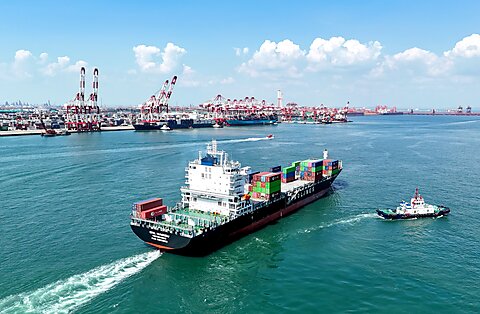Colin Grabow
In an ambitious move to promote coastal shipping, India’s government reportedly plans to abolish cabotage restrictions that prevent foreign vessels from transporting goods between the country’s ports. The rationale is easy to understand. With India’s merchant fleet comprising less than one percent of the world’s deadweight tonnage (essentially, carrying capacity), the existing cabotage law places the vast majority of the world’s shipping off‐limits for transportation within India. That means fewer options, higher prices, and added pressure on other transport modes such as trucking and rail.
If India proceeds with the planned opening of its domestic maritime market, it will continue something of a recent international trend. In 2021 China relaxed its protectionist maritime measures on a trial basis to allow the transshipment of international cargo via Chinese ports on foreign‐flagged ships. And last year Brazil eased its cabotage laws to bolster competition and the use of domestic shipping. Canada, meanwhile, extended limited cabotage privileges to European Union vessels as part of a trade agreement with the EU that took effect in 2017.
Past decades have seen other notable examples of cabotage restrictions being pared back. In 1993–2004 the European Union liberalized maritime cabotage among EU members, and in 1993 New Zealand allowed foreign vessels visiting the country in the course of conducting international trade to engage in limited domestic transport. In the latter case, even this relatively modest step appeared to produce significant benefits, correlating with a 20–25 percent decline in freight rates from 1994–2000 and improved service.
In stark contrast, the United States clings to the 103‐year‐old Jones Act, described by the World Economic Forum as the world’s “most restrictive example” of a cabotage law. The title is well deserved. A 1991 U.S. Maritime Administration summary of the world’s cabotage laws, for example, found the United States was one of just six countries—Brazil, Egypt, Indonesia, Peru, and Spain being the others—that required vessels used in domestic trade to be constructed in that same country. Since then, Spain has discarded its prohibition on foreign‐built vessels, Brazil has liberalized its cabotage law, and the other countries have requirements significantly less severe than those of the Jones Act.
Numerous other countries, including neighboring Canada and Mexico, also already have commonsense waiver provisions allowing the use of foreign vessels if no domestic vessel is available. The United States, meanwhile, only allows Jones Act waivers—rarely issued—for reasons of national defense, and in recent years has made it even more difficult to obtain them.
Unwillingness to reform or repeal the Jones Act is particularly unfortunate given the significant gains the United States stands to reap from liberalization. That approximately 40 percent of the U.S. population—including over 5.5 million Americans in Alaska, Guam, Hawaii, and Puerto Rico who heavily rely on marine transport—lives in coastal areas speaks to the opportunity costs stemming from inefficient (or non‐existent) domestic shipping. Even modest reforms would still pay considerable dividends.
When confronted with the Jones Act’s costs, supporters of the law typically attempt to justify maritime protectionism as a national security imperative. Such claims should be met with considerable skepticism. Indeed, that both China and India—countries that hardly regard national security considerations as an afterthought—have targeted their cabotage laws for reform further undermines such arguments.
Recent efforts at cabotage liberalization around the world suggest an increasing appreciation of the costs of existing maritime transport restrictions and the potential efficiency gains from their removal or relaxation. Given its maritime disposition, the United States stands to similarly benefit should it follow in these other countries’ footsteps by repealing or reforming its own highly restrictive cabotage law.

